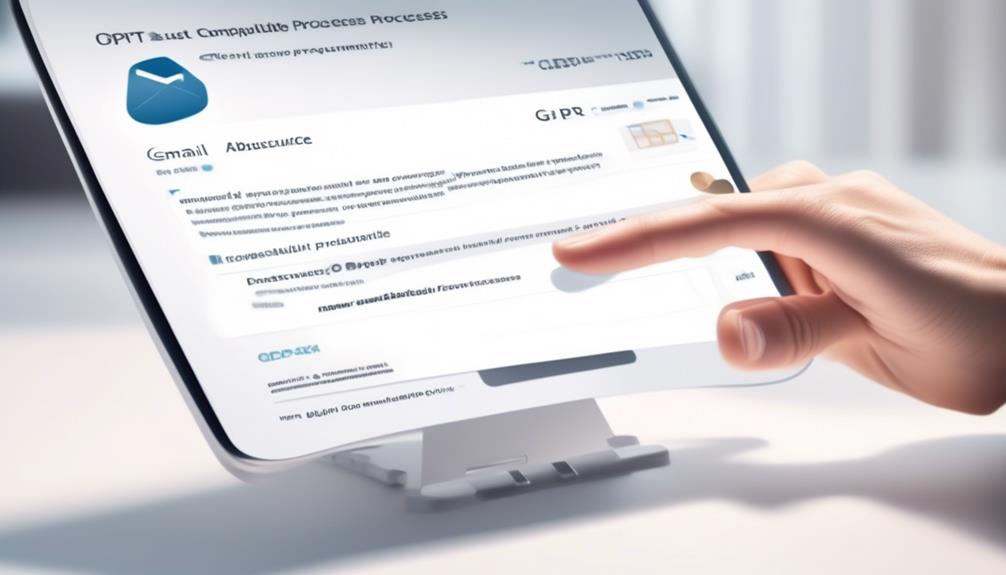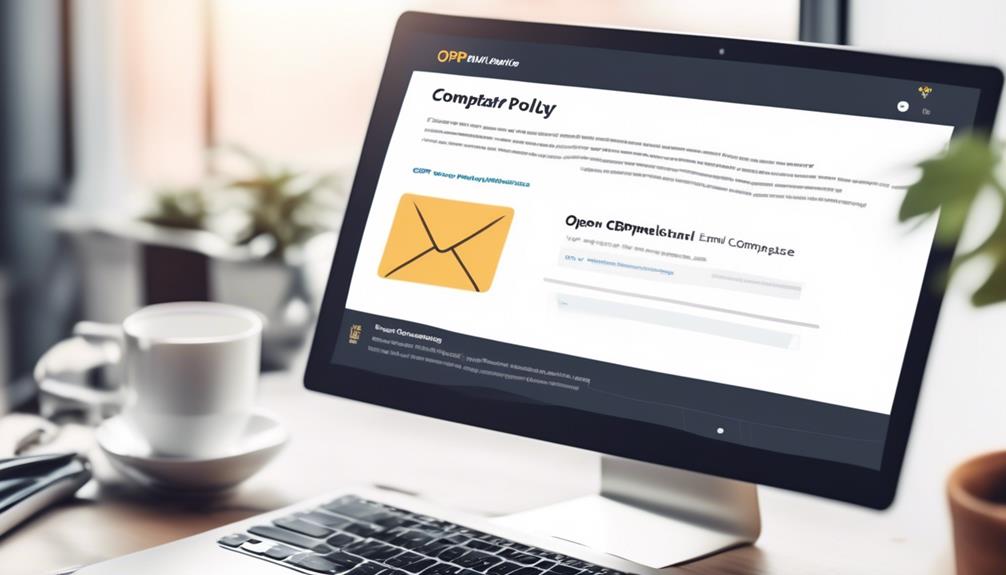You may already know about GDPR and how it impacts email marketing, but are you sure your strategies fully align with the rules? It’s natural to wonder if there’s something you might have missed. But fret not, as we’ve got you covered with six crucial tips to keep you on the right side of the law and strengthen your bond with your email subscribers. If you want to boost your email marketing game while staying compliant, keep reading for valuable advice that will help you navigate the rules smoothly.
Trust us, you don't want to miss out on these key GDPR compliance strategies for email marketers.
Key Takeaways
- Obtain valid and freely given consent from users for email marketing purposes.
- Clearly explain the purpose of data collection and implement a clear consent process.
- Implement data protection measures and provide opt-out options to ensure compliance with GDPR.
- Offer a user-friendly opt-out process that allows individuals to manage their preferences easily.
Understanding GDPR Requirements
In ensuring GDPR compliance for email marketing, the understanding of its requirements is crucial to effectively navigate the regulations and uphold data protection standards.
GDPR, which governs the use of personal data, significantly impacts email marketing activities. It necessitates obtaining valid consent from users before sending marketing emails. This consent must be freely given, specific, informed, and unambiguous, requiring clear and affirmative action.
Understanding GDPR's principles of lawfulness, fairness, and transparency is paramount. It mandates that individuals have control over their personal data, emphasizing the importance of privacy in email marketing.
Compliance involves implementing data protection measures, ensuring the accuracy and relevance of user data, and limiting the storage of personal information. Additionally, email marketers must provide easily accessible opt-out options, allowing users to withdraw their consent at any time.
To comply with GDPR, creating a comprehensive privacy notice that outlines how personal data is used and protected in marketing activities is essential.
Upholding GDPR requirements in email marketing not only ensures legal compliance but also fosters trust and credibility with subscribers.
Obtaining User Consent

When obtaining user consent, it's crucial to clearly explain the purpose of data collection and ensure that explicit consent is obtained from users.
It's important to establish a clear consent process and document consent records to demonstrate compliance with GDPR regulations.
Clear Consent Process
With GDPR regulations in place, ensuring a clear and straightforward consent process is essential for email marketers to obtain user consent. When obtaining consent, it's crucial to clearly state the purpose of data collection and who'll have access to the data.
Implementing a system to track user data and preferences ensures that data is processed correctly, contributing to transparency and accountability. Providing clear and easy opt-out options, as well as a simple way for users to update their preferences and access their data details, demonstrates a commitment to informed consent.
It's imperative to use clear and unambiguous language when obtaining consent, avoiding legal jargon, and offering granular consent options for different types of marketing emails. Regularly reviewing and updating security measures to protect personal data is essential for maintaining GDPR compliance and establishing a lawful basis for processing user data.
Documenting Consent Records
Ensuring a clear and straightforward consent process is essential for email marketers to obtain user consent. Documenting all user consent, including the identity of the user, date of consent, and a detailed statement, is a critical aspect of GDPR compliance. It's imperative to store consent records, making them readily accessible for auditing and compliance verification.
Each planned use of collected data should have a specific consent process that requires positive opt-in action. Email marketers should avoid pre-checked boxes, and make the process of unsubscribing and revoking consent easy and immediate.
Furthermore, it's essential to have a clearly stated and accessible privacy policy that discloses the use of collected data. By adhering to these guidelines, email marketers can ensure compliance with GDPR while respecting the personal data of individuals.
Implementing Privacy Notice
Incorporating a comprehensive privacy notice into our email marketing strategies is essential to ensure compliance with GDPR regulations. This privacy notice should provide clear and transparent information about the collection and processing of personal data.
Here are three key elements to consider when implementing a privacy notice:
- Clearly state the purpose of data collection and who'll have access to it. Transparency is crucial in building trust with our audience and demonstrating compliance with GDPR regulations.
- Implement a system to track user data and preferences as part of the privacy notice. By doing so, we can ensure that we're processing data correctly and in line with the consent terms provided by the individuals.
- Update our privacy policy to be transparent about data usage, including details on data capture, storage, processing, and access. This will provide individuals with a clear understanding of how their data is being handled and their rights regarding its usage.
Managing Opt-out Process

When managing the opt-out process, it's crucial to have a clear and easily accessible method for subscribers to opt out of receiving marketing emails. We need to ensure that the opt-out process is user-friendly, making it simple for subscribers to exercise their right to withdraw consent.
Additionally, we must promptly honor opt-out requests and provide confirmation to subscribers that their preference has been successfully recorded.
Clear Opt-Out Process
To ensure GDPR compliance, email marketers must provide a clear and user-friendly opt-out process for subscribers to manage their preferences.
When managing the opt-out process, it's crucial to:
- Clearly inform subscribers about their right to request and withdraw consent for receiving marketing communications.
- Implement a transparent and easily accessible opt-out mechanism that allows individuals to update their preferences and personal data effortlessly.
- Track and respect user preferences and opt-out requests effectively to ensure compliance with GDPR regulations.
User-Friendly Opt-Out
As we focus on enhancing GDPR compliance in email marketing, ensuring a seamless and user-friendly opt-out process remains a pivotal aspect for subscribers' control over their preferences and data.
To ensure GDPR compliance for emails, it's crucial to give users the ability to manage their preferences easily and to opt out of email communications. The opt-out process must be user-friendly, allowing individuals to withdraw their consent freely.
It's imperative to respect and honor opt-out requests promptly and efficiently. Providing clear instructions and a simple, one-click unsubscribe process is essential for user data protection and compliance with GDPR requirements.
Opt-Out Confirmation Prompt
Implementing an opt-out confirmation prompt in the email marketing process ensures explicit consent from users when unsubscribing from marketing emails, enhancing transparency and accountability in compliance with GDPR guidelines.
When managing the opt-out process, using an opt-out confirmation prompt is crucial. Here are three key elements to consider:
- Reconfirmation of Decision: The prompt allows users to reconfirm their decision to unsubscribe from marketing communications, ensuring clarity and specificity in the opt-out process.
- Final Opportunity: It provides users with a final opportunity to reconsider their decision to unsubscribe from marketing emails, aligning with GDPR's emphasis on user control.
- Enhanced Compliance: The opt-out confirmation prompt helps in ensuring that the opt-out process is in line with GDPR guidelines, contributing to transparent and compliant email marketing practices.
Regular Mailing List Audits

Regularly reviewing and cleaning mailing lists is essential to uphold GDPR compliance and ensure the lawful processing of personal data. As email marketers, we must ensure that our marketing emails comply with the General Data Protection Regulation (GDPR) regulations.
Regular mailing list audits are crucial to maintaining GDPR compliant practices. It's imperative to regularly review and update security measures to protect personal data stored on our email marketing platform. Additionally, we must respect subscribers' rights and respond promptly to their requests regarding their personal data.
To ensure genuine consent, implement a double opt-in confirmation process for subscribers to receive marketing communications. This demonstrates our commitment to abiding by GDPR regulations and ethical email marketing practices.
Furthermore, conducting regular mailing list audits allows us to verify that all data processing meets GDPR consent and storage requirements. By incorporating organizational measures to protect personal data and regularly auditing our mailing lists, we can confidently demonstrate our commitment to GDPR compliance and responsible use of personal data.
Utilizing Double Opt-in

In maintaining our commitment to GDPR compliance and ethical email marketing practices, we can strengthen our data processing accountability by incorporating the use of double opt-in for subscriber consent. Utilizing double opt-in offers several benefits for email marketers:
- Explicit Consent: Double opt-in ensures that individuals actively and knowingly consent to receiving marketing communications. This aligns with GDPR's requirement for obtaining explicit consent before processing personal data for marketing purposes.
- Data Accuracy: It helps verify the accuracy of subscriber information and reduces the risk of fake or mistyped email addresses, contributing to the data controller's responsibility to maintain accurate and up-to-date data.
- Trust Building: Implementing double opt-in demonstrates a commitment to transparency and ethical data collection practices, which can help build trust with subscribers. This is crucial for maintaining a positive relationship with our audience while also ensuring GDPR compliance.
Frequently Asked Questions
How Do I Comply With GDPR Email Marketing?
We comply with GDPR email marketing by obtaining explicit consent, stating lawful data collection purposes, implementing clear consent processes, and regularly reviewing security measures.
We prioritize privacy and security in every email marketing stage, ensuring accuracy and lawful use of data.
It's essential to avoid pre-checked boxes and provide opt-out mechanisms.
We strive to protect personal data and promptly respond to subscriber requests, making GDPR compliance a top priority in our email marketing efforts.
What Is the GDPR Fine for Email Marketing?
We need to be mindful of GDPR fines for email marketing, as they can range from €10 million to €30 million, or 2% to 4% of global turnover.
It's crucial to ensure explicit consent from EU citizens and compliance with GDPR regulations to avoid penalties.
Our focus should be on obtaining clear consent before sending marketing emails and maintaining the accuracy and lawful use of personal data to steer clear of potential fines.
What Are the 10 Key Requirements of Gdpr?
We've researched the 10 key requirements of GDPR and found that they include:
- Consent
- Transparency
- Data minimization
- Security
- Accountability
- Subscriber rights
These requirements demand careful attention to detail and a deep understanding of legal obligations. Our expertise in this area allows us to communicate these complex concepts clearly.
What Are the 7 GDPR Requirements?
We ensure GDPR compliance through the following measures:
- Obtaining explicit consent for marketing emails
- Stating lawful purposes for data collection
- Maintaining accurate, up-to-date, and lawful personal data use
In addition, we take steps to protect data from unauthorized access, document consent, and appoint a data security officer. These measures are vital for meeting the 7 GDPR requirements and safeguarding personal data.
What Are the Most Important Tips for GDPR Compliance in Email Marketing?
When it comes to GDPR compliant email marketing, there are a few key steps to keep in mind. First, ensure that you have explicit consent from individuals before sending them marketing emails. Second, provide easy opt-out options. Third, regularly update and clean your email lists to remove inactive or non-consenting contacts. These key steps are crucial for GDPR compliant email marketing.
Conclusion
In conclusion, by embracing the GDPR requirements, we can ensure that our email marketing practices are respectful of individuals' privacy and preferences.
By implementing these compliance tips, we can enhance our relationships with subscribers and demonstrate our commitment to transparency and trustworthiness.
It's all about staying informed and adapting our strategies to meet evolving regulations, ultimately leading to stronger engagement and a more positive experience for everyone involved.








